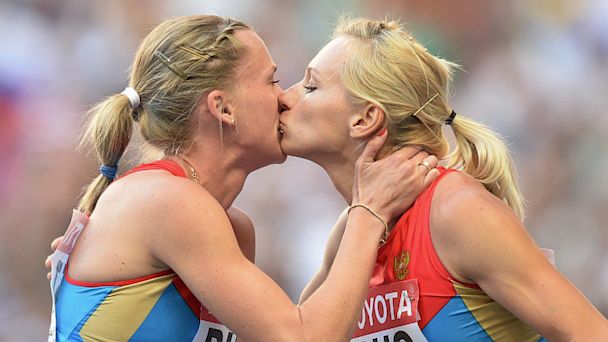Russian Runners Deny Podium Kiss Was Protest Against Anti-gay Law

Yuri Kadobnov/AFP/Getty Images
MOSCOW - A pair of champion Russian runners are denying that their kiss atop the podium last weekend was a silent protest of their country's new anti-gay law.
Ksenia Ryzhova and Yulia Guschina kissed each other on the lips as they celebrated winning gold in the women's 4x400m relay at the World Athletics Championships, which were held in Moscow. The public display garnered headlines around the world.
"Yesterday I got calls from probably 20 different media outlets and instead of congratulating us for the gold medal, they decided to insult me and Yulia and the entire federation," Ryzhova said, according to RIA Novosti.
She stressed that the teammates have "no personal relationship" and that the suggestion their kiss was amorous was a "sick fantasy."
"We've trained for eight years in the same group and there's a really good friendship between us," she explained during a press conference.
Ryzhova first denied the act was a protest in an interview with the Guardian, published Monday night.
"It was just happiness for our team," she told the paper. She declined to describe her views on homosexuality.
"If people want to write all sorts of dirt about us, they should at least know that Yulia and I are both married," she added.
The kiss came amid increasing pressure on athletes and public figures to take a stand on the law, which prohibits what it calls propaganda of "non-traditional sexual relationships" around minors. Critics say it legitimizes the harassment of homosexuals and criminalizes promoting gay rights. Violators face fines and jail. Foreigners face similar penalties plus deportation. Some are calling on athletes to stage silent protests during sporting competitions in Russia to show their solidarity.
A Swedish athlete did exactly that last week, painting her fingernails in rainbow colors. That prompted Yelena Isinbayeva, Russia's champion pole vaulter and one of its most prominent athletes, to lash out against the Swede, saying the host country's laws should be respected. She went on to defend the anti-gay law.
"If we allow to promote and do all this stuff on the street, we are very afraid about our nation because we consider ourselves like normal, standard people," Isinbayeva said, speaking in English. "We just live with boys with woman, woman with boys."
She later backed off, saying she had misspoken in English.
That came just days after American Nick Symmonds dedicated his silver medal in the men's 800 meters to his gay and lesbian friends, becoming the first foreign athlete to speak out against the law from Russian soil.
"Whether you're black or white, gay or straight, everybody deserves to be treated equally," he told ABC News.
The law has sparked calls for a boycott of Russian products, including vodka. Some are even calling for a boycott of next year's Winter Olympics, which Russia will host in Sochi. Meanwhile, other prominent gay individuals have canceled plans to appear in Russia.
Andy Cohen, the two-time host of the Miss Universe pageant, said last week that he has declined an offer to host again when the event is held in Moscow in November. He cited the anti-gay law, saying it "didn't feel right as a gay man stepping foot into Russia."